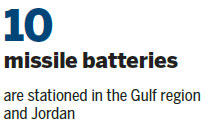Obama vows to keep Arab allies secure
New era of cooperation aims to allay fear of Iran's growing power
US President Barack Obama assured Arab allies on Thursday that they are safe from the threat of an empowered Teheran as he seeks to shore up some of his country's most critical security partnerships. But Obama's aim of winning Arab support for his nuclear diplomacy appears far from certain.
After a rare Camp David summit, the president pledged Washington's "ironclad commitment" to the Sunni governments of the Persian Gulf and even spoke of authorizing US military force if their security is endangered by Shiite Iran. The United States, he vowed, will "use all elements of power to secure our core interests in the Gulf region, and to deter and confront external aggression against our allies and partners."
Among those commitments is a US-supplied missile shield to protect Gulf nations against a hypothetical Iranian attack. Such a shield will take years to complete, requiring a step-up in regional trust, more US sales of sensitive weapons, and intensive US training to avoid mishaps in the volatile region.
A renewed joint commitment to build the regional defense system was one of the few firm outcomes of Thursday's summit. Past efforts have stalled due to tension and mistrust within the six-nation Gulf Cooperation Council, but US and Gulf officials say the time is now ripe to push ahead as Arab nations mount more joint military missions.
Obama invoked the start of a "new era of cooperation" that will last for decades, even as Saudi Arabia and others in the region are deeply unnerved by the prospect of an accord with Iran. Such a deal would impose a decadelong freeze on its nuclear program and potentially provide it tens of billions of dollars' worth of relief from international sanctions.

The US and other world powers hope to clinch a final nuclear deal with Iran by the end of June. This week's talks with top officials from the kingdoms of Bahrain, Kuwait, Oman, Qatar, Saudi Arabia and the United Arab Emirates were announced by Obama on April 2, when a framework with the Iranians was sealed.
The US military already has 10 Patriot missile batteries in the Gulf region and Jordan to defend against short-range ballistic missiles. The US also has a powerful AN-TPY-2 radar system to scan for missile launches, US officials said.
The Gulf countries are upgrading their existing Raytheon Patriot systems to incorporate new PAC-3 missiles built by Raytheon and Lockheed Martin, and are starting to buy wider-area and longer-range systems like Lockheed's Terminal High Altitude Area Defense System.
Obama rarely uses Camp David for personal or official business, and White House aides hoped the more intimate setting would foster candid conversation. But just two other heads of state - the emirs of Qatar and Kuwait - attended.
The most embarrassing absence for the US was Bahrain's King Hamad bin Isa Al Khalifa. He rejected the summit for a horse show in Britain and a meeting with the queen.
At the summit-closing news conference, Obama said Gulf leaders hadn't been asked to "sign on the bottom line" to approve a work in process.
AP - Reuters
(China Daily 05/16/2015 page12)














